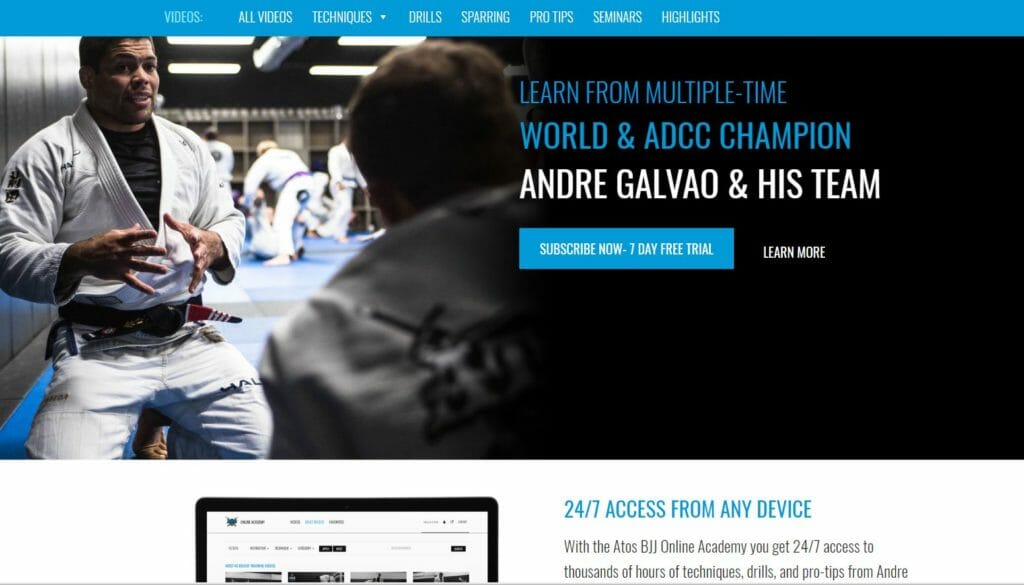The BJJ Transfer Student
Although I wish I could train under the same instructor from white to black belt, life has moved me around over the years. The upside of this is that I’ve visited quite a few BJJ schools. I’ve really dialed in what I want from a school, and what I don’t want.
There’s no shortage of articles online about finding a new school. Most of them are geared to new students. For a person with a few years of training under their belt, it’s a different challenge. We’re no longer a “blank slate”. We have preferences and opinions about training.
I started thinking about “advanced” tips for students that have some time in the game, and are now back in the free market. The main lesson I’ve learned is a great school can still be a poor match for you. You’re past the point of finding a “good” school. You need to find a good fit for the way you like to practice jiu-jitsu. Here’s a couple of tips I’ve picked up:
Ignore online reviews
Here’s the thing: the majority of people reviewing BJJ schools are current students leaving glowing reviews. They have no incentive to be overly critical of an instructor they have to see a few times a week. So I would take online reviews with a grain of salt.
You should also remember what I said above: People liking a BJJ school doesn’t mean you’ll like it, even if it’s a quality place The exception here is if a school has across the board terrible reviews. Then I would take them seriously.
A better way to gauge a school’s quality is to hop on social media. Martial arts forums, Facebook groups, and the like will often have honest impressions. You can ask if anyone with experience at the school can private message you.
Don’t just go for the name
When we’re exploring a new area, we often start by googling the big names and well-known teams. There are some definite pros to this. Schools with BJJ celebrities are usually top-notch, with excellent instructors and well-kept facilities. You can also take pride in training with a household name. But there are some trade-offs to think about.
For one, it’s possible that the head instructor is traveling more than they’re teaching. Instructors like the Gracie brothers or Eddie Bravo spend considerable time at their affiliate schools and teaching seminars.
At their headquarters, regular classes often are taught by a team of instructors. These people often are the unsung heroes that keep the school running. You may be able to brag on Instagram about how you’re training at so-and-so’s academy, but in reality, you have no relationship with them at all.

If the instructor is still competing in their prime, their school may be a never-ending training camp, focused on a core group of athletes. It could be a school of killer tournament players, so you have to make sure that’s what you want.
It’s also worth noting that “brand name” schools like Atos or Art of Jiu-Jitsu can be very commercial. Expect to pay more, purchase their apparel, etc.
Smaller schools are worth checking out. They often have quality students and teachers. What’s more, you may be able to develop stronger relationships with a teacher, which should be important to you.
Go during the day if you can.
The evening is a busy time at a BJJ school. Parents trying to corral their kids, guys showing up for class and chatting with instructors, even other new students signing up with you. If you’re looking to strike up a conversation with an instructor or owner, they may be too busy.
If a school has day classes, it’s smart to wander in and see if you can catch an instructor while they have some free time. You may get a private tour of the gym, and have a quality introduction to the school.
Even if the school has no day classes, try driving by anyways. The odds are decent you’ll find someone catching up on their paperwork, teaching a private lesson, or an informal open mat.
Research the instructor
You don’t have to have hired a private investigator, but throw your instructor’s name into Google and see what comes up. It’s good to know who their teacher is/was, and if they are on good terms. Is this school part of a larger team that you will be associated with? Do they have training or competition footage on YouTube? BJJ Heroes has the largest database of instructors and is a good starting point.
You should always do a little research to see how your instructor is seen in the rest of the BJJ community. Even if it doesn’t matter to you, it’s good to know that it might matter to other people.
Learn About Their Curriculum
Some schools have a very “bring what you have” approach to jiu-jitsu. Each instructor teaches what they like, and each student can incorporate what they want into their game. Other schools have a more standardized system that they teach. It could be a highly structured week-to-week plan.
Both setups are fine, it’s more about what you need in your training. If you’re frustrated that your game is uneven and you’re not evolving, an organized academy will push you to learn outside of your comfort zone.
On the other hand, if your jiu-jitsu is pretty personalized, you need to know that you’ll be free to practice your style on the mats. If you’re really into leglocks, you don’t want to train at a place where you’ll be chided for using them.
This also includes knowing whether a school is teaching more traditional Gracie Jiu-Jitsu or not. Traditional schools may seldom if ever, teach the latest guards dominating the tournament scene. Likewise, very progressive schools may never teach self defense.
Give yourself a few weeks to train somewhere
Most schools let you try a class for free, but that’s rarely enough. Whatever is being taught on a given night may not be representative of the school as a whole. You want to attend classes from each instructor, see what kind of BJJ they emphasize, and see if they have different formats for classes. You’ll also need that time to get a feel for the students and the culture of a school. And honestly, it takes time to notice the things you don’t like.
If a school offers month to month plans, then maybe pay for a month upfront. If they push you to sign a contract, just tell them that you may not be there that long and ask if you can work something out. In my experience, schools are flexible and will take something over nothing.
If a school is really pushing you towards a contract, I’d be careful. Many times, contracts are non-refundable and you could get stuck somewhere that you discover isn’t a good match in a month or two. Contract’s are not uncommon in BJJ and it isn’t always a red flag. But, in my opinion, schools benefit from contracts far more than the actual students. A great academy will earn your business month to month with great service.
Have some tips for us?
Those are my tips for being a BJJ transfer student, but I’m sure you have some too. Feel free to comment and share your knowledge with the youjiujitsu community.
Hey, have you heard about Henry Akin’s mind-blown club? It’s an exclusive club (200 members in the first round) that Professor Akins will provide access to special seminars and a monthly Q&A just for members. It’s currently closed and not taking any more students.





